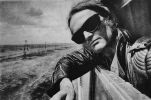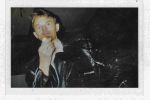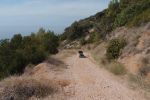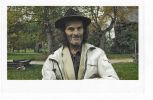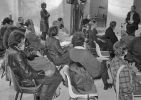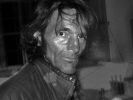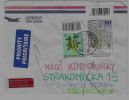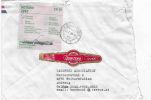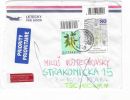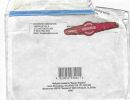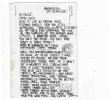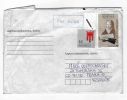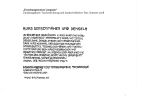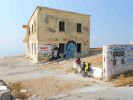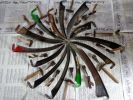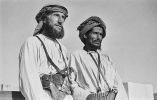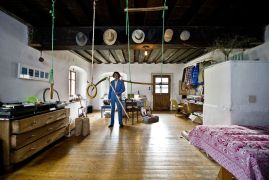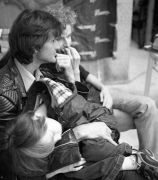Karl Katzinger (Freistadt October 1953 - April 2021) was an artist, film-maker, writer, organizer, traveller and scythe coach. From 1973 to 1981 he lived in Vienna, where he studied pharmacy and occasionally wrote for newspapers. In 1981 he moved to his grandparents' farm in Harrachstal near Freistadt and has stayed there ever since, except for his travels to far and near countries. Here he founded various organizations such as the Backwood Association, or the Research Institute for Zero Emission Technology and hosted courses, lectures, music and theater performances in the Drushba Garage which is part of the farm. From May to October, he gave classes in scything. He was a passionate traveller and visited many places such as Somalia, Yemen, Sudan, Kazakhstan, Uzbekistan, Azerbaijan, Russia, Ukraine, Albania.... and spent his last time in the Bohemian Forest.
In 2000, I invited John Tylo to Prague to screen a selection of his travel films in the NOD space as part of the then one year Cafe9.net program. Later he would like to get his film documentaries to be screened at the film festival in Ji-hlava, which he visited several times. Of course it failed, because John didnt have a producer. In return, however, John from the beginning of the 90s was inviting to his Cafe Družba dwelling many Czech and Moravian (along with other Eastern and Central European) artists. Karl was one of the main inspirations behind the concept of the Lost Expedition.
(miloš vojtěchovský, 2023)
I AM WATCHING THE STARRY SKY FROM MY BATHTUB
by Karl Katzinger
My grandparents used to run an inn in this house in Harrachstal. In the summer there were guests from Vienna, otherwise it was primarily a place for woodworkers and carters. There are huge forest estates all around, and the boards produced in the count's sawmill were transported by horse-drawn carts brought to the Freistadt train station. It was strenuous work. Here the carters could play cards and smoke a pipe. The inn was closed in the 1950s.
The house dates back to the 17th century and was expanded by my grandparents. I've lived here for about 35 years now. In the former dining room, which I now use as a living room and study, there is a brick oven that I lean against in the winter when I read Wilfred Thesiger's travel reports again and again. In the kitchen there is a large tiled table stove with two ovens and a water vessel. In the former guest rooms on the first floor is my archive: diaries and photographs from trips to Somalia, Yemen, Sudan, Kazakhstan, Uzbekistan, Azerbaijan and so on. There are old cameras, 16 mm film rolls, Super 8 films and cassettes with audio recordings of train rides in the former USSR, of subway rides in Kiev, Moscow and Paris.
I don't need luxury. I just need contact with myself. My toilet is a small wooden house with a composting toilet under the apple tree. This means that 15 m³ of drinking water per year is not contaminated with shit. For bathing I use a wooden tub made of spruce. The water stays warm for an hour. I always bathe outdoors. Of course also in winter. I can watch the starry sky from the bathtub. Once a while I smoke a low-budget Cuban cigar.
Large parts of the furnishings in the house are still original. I have little money, but I don't want to make any major changes. I have little connection to material things. If I need something, I find it secondhand somewhere. The only important things for me are my sun hats and spare scythe blades. I am mowing my 4000 m² garden with a scythe. I compost the grass and use it in my vegetable garden. Concerning fruit and vegetables, I am self-sufficient. I produce everything myself and eat vegan. Today I know my way around quite well. I organized recently a symposium on the topic of subsistence and self-sufficiency. And in spring, summer and autumn I offer scythe mowing courses.
For 20 years, I organized cultural events in my grandfather's former garage - until a zealous man who became mayor described my garage as a security risk. At that time, huge police operations were used to prevent many country dance courses taking place there. He also wanted to connect my house to the sewer network, even though there are no pipes in it. This has been going on for ten years. The stack of documents is already 50 centimeters high. This is my house, this is my property. I don't see why a mayor would want to tell me how I should live.
As for my future: I would love to undertake a bike tour around the world. On mountain roads in Albania, for example, there are hardly any cars driving around. Everything I own would be on the luggage rack and in the bike saddle bags. I would sleep in the tent and thus solve another problem: I keep losing my house keys. Than that would be over.
The orginal German text was published in Der Standard in 6.6. 2017, in a portrait by Karl by Wilfred Thesiger, photo: Dietmar Tollerian
note: Wilfred Thesiger born June 3, 1910, Addis Ababa, Ethiopia—died August 24, 2003 in London, British soldier and travel writer who was a colonial explorer in the tradition of Sir Richard Burton and T.E. Lawrence. His most important writings, based on his travels to remote areas of Africa and Asia, include descriptions of the societies of the Bedouins of the Arabian Peninsula and the Marsh Arabs of southern Iraq. His works display a deep admiration for the traditional cultures of the peoples that he lived among, as well as romantic distaste for modern Western civilization and inventions such as motor vehicles and telecommunications, which he saw as threats to those peoples’ unique ways of life.
